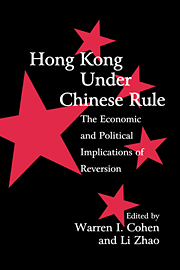Book contents
- Frontmatter
- Contents
- List of Contributors
- Introduction
- 1 Hong Kong as an International Commercial Center
- 2 Cooking the Rice without Cooking the Goose: The Rule of Law, the Battle over Business, and the Quest for Prosperity in Hong Kong after 1997
- 3 Hong Kong Faces 1997: Legal and Constitutional Issues
- 4 The Economic and Political Integration of Hong Kong: Implications for Government–Business Relations
- 5 Hong Kong and Greater China: An Economic Perspective
- 6 One Country, Two Currencies: Monetary Relations between Hong Kong and China
- 7 Political Participation in Hong Kong: Trends in the Mid-1990s
- 8 Strategic and Military Implications of Hong Kong Reversion
- 9 Hong Kong and China's Integration into the International Community
- 10 Hong Kong as a Problem in Chinese–American Relations
- 11 Post–July 1997 Challenges
- Index
10 - Hong Kong as a Problem in Chinese–American Relations
Published online by Cambridge University Press: 22 March 2010
- Frontmatter
- Contents
- List of Contributors
- Introduction
- 1 Hong Kong as an International Commercial Center
- 2 Cooking the Rice without Cooking the Goose: The Rule of Law, the Battle over Business, and the Quest for Prosperity in Hong Kong after 1997
- 3 Hong Kong Faces 1997: Legal and Constitutional Issues
- 4 The Economic and Political Integration of Hong Kong: Implications for Government–Business Relations
- 5 Hong Kong and Greater China: An Economic Perspective
- 6 One Country, Two Currencies: Monetary Relations between Hong Kong and China
- 7 Political Participation in Hong Kong: Trends in the Mid-1990s
- 8 Strategic and Military Implications of Hong Kong Reversion
- 9 Hong Kong and China's Integration into the International Community
- 10 Hong Kong as a Problem in Chinese–American Relations
- 11 Post–July 1997 Challenges
- Index
Summary
HONG Kong confronts American foreign policy makers with a classic foreign policy dilemma. Despite its superpower status, there appears to be no way for the United States to bring that power to bear on the issue of Hong Kong's reversion to China. The United States lacks legal standing even though its role in and commitment to Hong Kong have been significant for the past fifty years. Options are further circumscribed by widespread apathy in the United States. Yet, Americans have much to lose if Hong Kong's retrocession goes badly – not only in Hong Kong itself but also in the wider arena of regional interaction and, of course, in the difficult relationship with the People's Republic of China. So far, developments in the transition that will span the change of sovereign authorities suggest that the long-term prognosis for Hong Kong and the U.S. presence in the territory is, at best, uncertain, unstable, and troubled.
American opposition to the continued British occupation of Hong Kong as a colony after the end of the Second World War serves as an ironic backdrop to the growth of American involvement in the territory thereafter. Franklin Roosevelt had insisted during the course of the war that the phenomenon of colonialism would have to end and promised Madame Chiang Kai-shek that Hong Kong would be restored to Chinese control. However, the combination of Prime Minister Winston Churchill's obduracy on the subject and the Chinese civil war invalidated such guarantees, and British troops retrieved the colony without resistance.
- Type
- Chapter
- Information
- Hong Kong under Chinese RuleThe Economic and Political Implications of Reversion, pp. 213 - 228Publisher: Cambridge University PressPrint publication year: 1997

